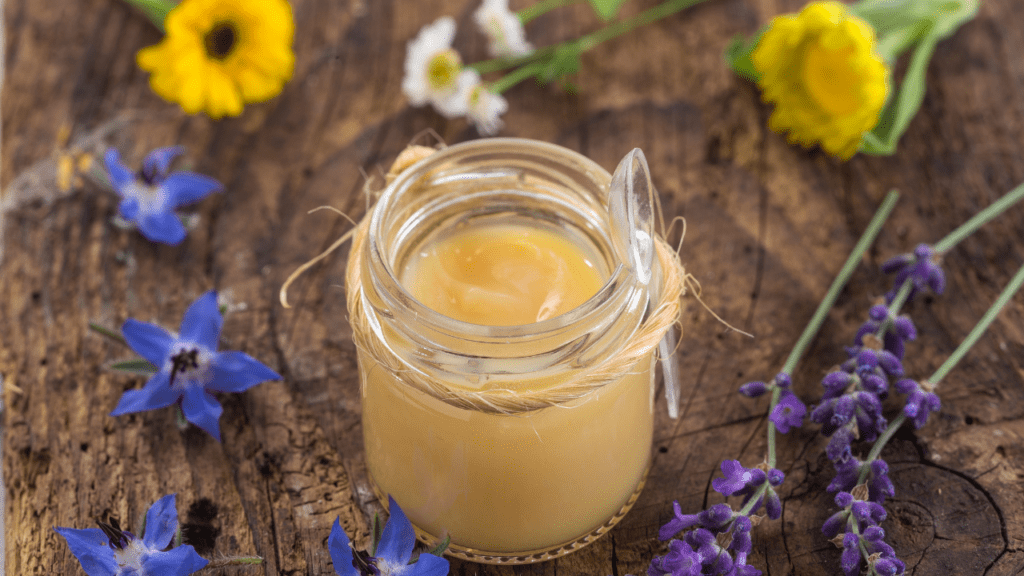Royal jelly, a nutrient-rich secretion produced by honeybees, has gained increasing attention for its potential health benefits, particularly as a nootropic supplement. Traditionally known for its role in the development of queen bees, royal jelly is packed with bioactive compounds that may influence human health, particularly cognitive function. This article provides an in-depth exploration of royal jelly’s chemistry, potential nootropic benefits, recommended dosages, possible side effects, and important considerations regarding interactions with medications and other supplements.
You May Also Like:
Royal Jelly: Potential Nootropic Benefits, Dosage, Side Effects, Interactions and Other Important Information About This Supplement is an original (NootropicsPlanet) article.
Source of Royal Jelly
Royal jelly is produced by worker bees and serves as the exclusive food source for developing queen bees. The composition of royal jelly is complex, comprising a mix of proteins, lipids, sugars, vitamins, minerals, and unique bioactive compounds such as royalactin and 10-hydroxy-2-decenoic acid (10-HDA). The precise nutritional makeup can vary depending on factors such as the season and geographic location, but it consistently contains high concentrations of essential nutrients.
Unlike honey, which is primarily a carbohydrate source, royal jelly is rich in proteins and fatty acids, making it unique in its ability to support various physiological processes, particularly those related to brain function and development.

Chemistry of Royal Jelly
Royal jelly’s complex chemical profile underpins its wide range of potential health effects. One of its most important active components is 10-HDA, a fatty acid that has been shown to exhibit antioxidant, anti-inflammatory, and neuroprotective properties. Additionally, royal jelly contains proteins such as major royal jelly proteins (MRJPs), which are thought to influence brain function by promoting neurogenesis and protecting against oxidative damage. Other components, including acetylcholine, a key neurotransmitter, may play a direct role in enhancing cognitive function and memory.
The antioxidant properties of royal jelly, largely attributable to its flavonoids, phenolic acids, and proteins, are of particular interest in nootropic research. By reducing oxidative stress and inflammation, royal jelly may protect neurons from damage and support overall brain health.
Physiological Mechanisms of Action in the Body and Brain
The potential nootropic effects of royal jelly are likely due to its ability to modulate several key physiological processes, particularly those related to antioxidant defense, inflammation, and neurotransmitter regulation.
- Neuroprotective Effects: Royal jelly has demonstrated potential as a neuroprotective agent, thanks to its antioxidant properties. Oxidative stress, a result of an imbalance between free radicals and antioxidants, is a major contributor to neurodegenerative diseases such as Alzheimer’s and Parkinson’s. The antioxidants in royal jelly, particularly 10-HDA and phenolic compounds, help neutralize free radicals, reducing the risk of neuronal damage.
- Neurogenesis and Synaptic Plasticity: Research suggests that royal jelly may stimulate the production of new neurons, a process known as neurogenesis, particularly in the hippocampus—a region of the brain critical for learning and memory. This is thought to be driven by MRJPs, which may activate pathways involved in cell growth and survival.
- Acetylcholine Modulation: Acetylcholine is a neurotransmitter involved in many aspects of cognitive function, including memory, attention, and learning. Royal jelly contains acetylcholine, which may contribute to enhanced cognitive performance by increasing the availability of this critical neurotransmitter in the brain.
- Anti-inflammatory Effects: Chronic inflammation is implicated in cognitive decline and neurodegenerative diseases. Royal jelly’s anti-inflammatory properties may help protect against these processes, supporting long-term brain health and cognitive function.

Nootropic Benefits of Royal Jelly
Royal jelly’s potential nootropic benefits stem from its ability to enhance brain function through multiple mechanisms, including antioxidant defense, acetylcholine modulation, and neurogenesis. Here are some specific ways royal jelly may benefit cognitive health:
- Memory Enhancement: Several animal studies have demonstrated that royal jelly may improve memory and learning abilities, possibly due to its acetylcholine content and ability to promote neurogenesis. While human studies are still limited, the available research suggests that royal jelly may help enhance memory, particularly in aging populations or individuals with cognitive impairment.
- Neuroprotection Against Age-Related Cognitive Decline: Due to its antioxidant and anti-inflammatory properties, royal jelly may protect against age-related cognitive decline. Oxidative stress and chronic inflammation are major contributors to neurodegeneration, and by mitigating these processes, royal jelly may help maintain cognitive function as individuals age.
- Mood and Stress Regulation: Some preliminary evidence suggests that royal jelly may have mood-enhancing effects, possibly by modulating neurotransmitters like serotonin and dopamine. These effects may contribute to better emotional regulation and a reduction in stress, indirectly supporting cognitive performance.
- Enhanced Cognitive Clarity and Focus: The ability of royal jelly to support energy metabolism and acetylcholine production may lead to improved mental clarity and focus, particularly during periods of mental fatigue or stress.

Dosage and Supplementation Guidelines
Royal jelly is available in various forms, including capsules, liquid extracts, and fresh jelly. However, determining the optimal dosage for cognitive benefits is challenging due to the limited research on human subjects. Below are some general guidelines:
- Standard Dosage: Most studies on royal jelly use doses ranging from 300 mg to 6,000 mg per day. For general nootropic benefits, a typical daily dose of 500 mg to 1,500 mg is commonly recommended. However, it is crucial to start with a lower dose to assess tolerance, particularly if combining with other supplements.
- Form of Supplement: Royal jelly supplements are available in fresh, freeze-dried, and capsule forms. Freeze-dried royal jelly is often preferred for its stability and ease of use. When choosing a supplement, it is important to verify the purity and source of the royal jelly to ensure that it contains adequate levels of active ingredients like 10-HDA.
- Duration of Use: Since royal jelly is a natural product, its effects may take time to manifest. Many users report noticeable benefits after 4-6 weeks of consistent use, although individual results may vary.
Side Effects and Safety
Royal jelly is generally considered safe for most individuals when consumed in appropriate dosages. However, some people may experience side effects, particularly those with allergies to bee products.
- Allergic Reactions: The most common side effect of royal jelly is allergic reactions, which can range from mild (e.g., hives, itching) to severe (e.g., anaphylaxis). Individuals with a known allergy to bees or bee products should avoid royal jelly supplements.
- Gastrointestinal Disturbances: Some users may experience nausea, vomiting, or diarrhea, particularly when taking higher doses. These side effects are typically mild and can often be minimized by reducing the dosage or taking the supplement with food.
- Skin Irritation: In rare cases, royal jelly may cause skin rashes or irritation. If such symptoms occur, discontinuing the supplement is recommended.

Interactions with Other Supplements and Medications
As with any supplement, it is important to be aware of potential interactions between royal jelly and medications or other supplements. While royal jelly is natural, its bioactive compounds may influence the metabolism or efficacy of certain drugs.
- Blood Thinners: Royal jelly may have anticoagulant properties, meaning it could potentially enhance the effects of blood-thinning medications like warfarin. Individuals taking these medications should consult their healthcare provider before adding royal jelly to their regimen.
- Immunosuppressants: Due to its immune-boosting effects, royal jelly may interfere with immunosuppressant medications. People undergoing treatments that involve immune suppression, such as organ transplant recipients, should avoid royal jelly.
- Other Nootropics: When used in combination with other nootropic supplements, royal jelly may enhance overall cognitive benefits. However, combining too many stimulatory or energy-boosting supplements could lead to overstimulation, headaches, or anxiety. As with any combination of supplements, moderation and careful monitoring are key.
Risks for Individuals with Certain Health Conditions
While royal jelly is generally safe for most people, individuals with specific health conditions should exercise caution when considering supplementation.
- Asthma or Respiratory Conditions: People with asthma may be more prone to allergic reactions when consuming royal jelly. In some cases, royal jelly has been reported to trigger asthma attacks, so individuals with respiratory conditions should avoid its use.
- Hormonal Imbalances: Royal jelly has been reported to influence hormonal activity, which could potentially affect individuals with hormone-sensitive conditions, such as breast or ovarian cancer. Consulting a healthcare professional before use is essential in such cases.
- Pregnancy and Lactation: Although royal jelly is generally safe, its effects during pregnancy and lactation have not been thoroughly studied. Pregnant and breastfeeding women should consult their healthcare provider before using royal jelly supplements.
Conclusion: Is Royal Jelly a Viable Nootropic Supplement?
Royal jelly offers a unique combination of bioactive compounds that may support brain health, making it a promising candidate for nootropic use. Its antioxidant, neuroprotective, and neurotransmitter-modulating properties suggest potential benefits for memory, focus, and cognitive clarity. However, while animal studies are encouraging, more research is needed to confirm these effects in humans.
For those interested in exploring natural nootropics, royal jelly may be a valuable addition to a well-rounded cognitive health regimen, provided it is used safely and in consultation with a healthcare provider. As with any supplement, individual results may vary, and it is essential to consider factors such as dosage, potential interactions, and underlying health conditions before incorporating royal jelly into your routine.

References:
- Current Status of the Bioactive Properties of Royal Jelly: A Comprehensive Review with a Focus on Its Anticancer, Anti-Inflammatory, and Antioxidant Effects. Retrieved from: https://pmc.ncbi.nlm.nih.gov/articles/PMC9921556/
- Health Promoting Properties of Bee Royal Jelly: Food of the Queens. Retrieved from: https://pmc.ncbi.nlm.nih.gov/articles/PMC7915653/
- Royal Jelly – Uses, Side Effects, and More. Retrieved from: https://www.webmd.com/vitamins/ai/ingredientmono-503/royal-jelly
- 12 Potential Health Benefits of Royal Jelly. Retrieved from: https://www.healthline.com/nutrition/royal-jelly
- Recent Advances in Health Benefits of Bioactive Compounds from Food Wastes and By-Products: Biochemical Aspects. Retrieved from: https://pmc.ncbi.nlm.nih.gov/articles/PMC9916361/
Important Note: The information contained in this article is for general informational purposes only, and should not be construed as health or medical advice, nor is it intended to diagnose, prevent, treat, or cure any disease or health condition. Before embarking on any diet, fitness regimen, or program of nutritional supplementation, it is advisable to consult your healthcare professional in order to determine its safety and probable efficacy in terms of your individual state of health.
Regarding Nutritional Supplements Or Other Non-Prescription Health Products: If any nutritional supplements or other non-prescription health products are mentioned in the foregoing article, any claims or statements made about them have not been evaluated by the U.S. Food and Drug Administration, and such nutritional supplements or other health products are not intended to diagnose, treat, cure, or prevent any disease.


